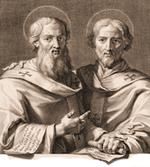Catholic Recipe: Election Cake
Election Day was the great holiday of early New England. In importance it ranked second only to Thanksgiving. Even after 1776, Election Day boasted more processions, sermons, social gatherings and good eating than either Fourth of July or Training Day — the time when volunteer militiamen marched and drilled in all their glory. Since our Puritan ancestors were denied the joys of Christmas, Easter, and Whitsunday, Election Day with its festivities — parades, religious ceremonies, balls, and fine foods — helped compensate for the loss.
"Their Chief Red Letter Day is St. Election which is annually Observed according to Charter to choose their Governor," wrote Madam Sarah Kemble Knight about the State of Connecticut, in her Journal of 1702. The Honorable John Winthrop, Esquire, a descendant of the Massachusetts founder, was Governor of Connecticut at the time. Madam Knight, a retired schoolmistress, who was traveling from Boston to New York on business, kept a diary of all the interesting customs and events she observed along the way.
At Hartford, Election Day — which came there on the second Thursday in May — was unmatched in excitement by any other occasion. A traditional feature was the famous Hartford Election Cake which, according to one old family recipe, called for seven eggs, five pounds of shortening (largely butter), a pint of yeast, and unspecified amounts of wine and brandy. In other places Election Cake might be just a sweet raised bread, topped by egg-and-molasses glaze, but in Hartford it resembled a rich well-seasoned fruit cake.
In his autobiography Edward Everett Hale, who was born in Boston and there became the most famous preacher of his day, reminisces on early nineteenth-century election customs. Every child expected a present of " 'lection money" from his elders, according to Mr. Hale. This was pocket money to squander at stalls and booths on the Common. For most youngsters election spending sprees were confined largely to things to eat and drink. The Hale children's mother gave each of her own brood twelve-and-a-half cents, and with coins jingling in pockets the young were off to the Common — boys with boys, and girls with girls. There, food hucksters sold such delicacies as dates, candies of all descriptions, and oysters — two for a penny. There were lobsters, too, for those who wanted them, but the Hale children got plenty of them at home. Ginger beer and spruce beer, sold from small wheelbarrows, were favorite thirst-quenchers. And if a lad lacked two cents — the price for a full glass — dealers obliged with a half glass at half price.
Election night supper was always a festive meal which featured such delicacies as homemade sausages, creamed potatoes — made with real cream and plenty of butter — pickles, relishes, and hot soda biscuits with fruit preserves. The meal ended with Election Cake and several kinds of pie.
There are many versions of Election Cake, the crowning glory of New England's holiday festivities. This cake — a cross between fruit cake and fruit-filled yeast bread — keeps a long time when wrapped in foil and stored in the refrigerator. A century and a half ago, housewives made the cake in quantities large enough to last the winter. There was enough fruit and brandy in the original Hartford variety to ensure freshness for several months. The cake was sliced and offered with wine or eggnog. I can think of no better way to serve it today, although the cake is delicious with all hot beverages, or with tall glasses of milk.
DIRECTIONS
Scald milk, add white sugar. When lukewarm add yeast, stir, and set aside for 5 minutes. Add 1 cup of flour, beat thoroughly and let rise in greased covered bowl until double in bulk (about 1 hour).
Cream butter and brown sugar until very light. Then add egg and brandy and beat vigorously. Add to raised yeast mixture and stir.
Dredge fruits with 2 tablespoons of the flour. Then sift together remaining flour with salt and spices and add to other mixture gradually, beating after each addition. If batter is too thin, a little more flour may be added. Work in fruits last of all.
Put dough in well-greased floured bread pan, or in 9- to 10-inch tube pan. Let rise, covered, in warm place until double in bulk (about 1 1/4 hours). Bake about 45 minutes in moderate oven (375° F.).
Some cooks prefer Election Cake decorated like fruit cake, others like a butter icing which, when ornamented with candied fruits, has a truly festive appearance. For the first type of decoration arrange candied cherries, citron, and other fruits on top of the dough before baking. A sheet of foil placed over the loaf will prevent scorching.
When frosting is used let the loaf cool thoroughly before spreading top and sides. Use Orange or Lemon Frosting (see recipe).
Recipe Source: Feast-Day Cakes from Many Lands by Dorothy Gladys Spicer, Holt, Rinehart and Winston, 1960





